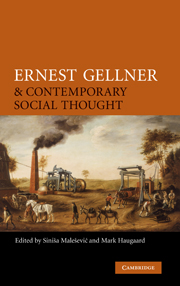Book contents
- Frontmatter
- Contents
- Notes on contributors
- Acknowledgements
- Introduction: an intellectual rebel with a cause
- Part I Civil society, coercion and liberty
- Part II Ideology, nationalism and modernity
- 5 Nationalism: restructuring Gellner's theory
- 6 Between the book and the new sword: Gellner, violence and ideology
- 7 Ernest Gellner and the multicultural mess
- Part III Islam, postmodernism and Gellner's metaphysic
- Index
- References
7 - Ernest Gellner and the multicultural mess
Published online by Cambridge University Press: 22 September 2009
- Frontmatter
- Contents
- Notes on contributors
- Acknowledgements
- Introduction: an intellectual rebel with a cause
- Part I Civil society, coercion and liberty
- Part II Ideology, nationalism and modernity
- 5 Nationalism: restructuring Gellner's theory
- 6 Between the book and the new sword: Gellner, violence and ideology
- 7 Ernest Gellner and the multicultural mess
- Part III Islam, postmodernism and Gellner's metaphysic
- Index
- References
Summary
One of Ernest Gellner's most quoted statements is the definition of nationalism on page 1 of Nations and Nationalism, indeed the very first sentence in the book: ‘Nationalism is primarily a political principle, which holds that the political and the national unit should be congruent’ (Gellner 1983: 1). Adding nuance to the definition later on the same page, Gellner adds that ‘ethnic boundaries should not cut across political ones, and, in particular … ethnic boundaries within a given state – a contingency already formally excluded by the principle in its general formulation – should not separate the power-holders from the rest’. Gellner sees the national idea as one based on ethnic identity. In this, his theory of nationalism contrasts with Benedict Anderson's, whose Imagined Communities (1991/1983) explores nationalism as a symbolically integrating force and attaches little importance to its ethnic component or lack of such. Anderson's perspective is also more global than Gellner's rather Eurocentric vision.
One of the most important theoretical debates about nationalism since the almost simultaneous publication of these seminal books in 1983 has concerned its relationship to ethnic identity. While Anderson has occasionally contributed to this discussion (e.g. in his Long-Distance Nationalism, 1992), Gellner rarely, if ever, commented on the implications of migration and transnationalism for national identities. Moreover, he did not engage with the difficult questions arising from the rights claims of indigenous groups either, largely limiting his analysis of nationalism to West and East European history up to and including the postwar years.
- Type
- Chapter
- Information
- Ernest Gellner and Contemporary Social Thought , pp. 168 - 186Publisher: Cambridge University PressPrint publication year: 2007
References
- 3
- Cited by



